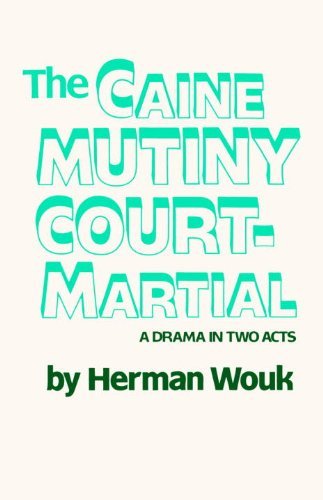The Caine Mutiny Court-Martial: A Drama in Two Acts – A Captivating Exploration of Morality and Human Conflict
There’s something thrilling about diving into a play based on a classic novel, especially when it carries the weight of rich historical and moral complexity. That’s precisely what drew me to The Caine Mutiny Court-Martial, Herman Wouk’s own stage adaptation of his Pulitzer Prize-winning novel. With its recent adaptation into a film featuring Kiefer Sutherland, I felt compelled to revisit the original narrative’s gripping exploration of duty, sanity, and the blurry lines of leadership.
At the heart of The Caine Mutiny Court-Martial lies a stark portrayal of a Navy ship’s mutiny during World War II, embedded with layers of ethical dilemmas. The narrative unfolds through a courtroom drama, which offers a compelling perspective on the characters grappling with their decisions under the immense pressures of wartime. I found myself deeply invested in Lieutenant Maryk, whose acts of rebellion stem from perceived insanity in Captain Queeg’s leadership. Through their testimonies, Wouk artfully navigates the complexity of loyalty and the toll it takes on the human psyche, eliciting a mix of empathy and frustration.
Wouk’s writing in this two-act play is nothing short of masterful. The dialogue is sharp, emotionally charged, and rich with subtext. Each character’s voice feels distinct and genuine; I was struck by how clearly their individual motivations and struggles expressed the broader themes of the play. One line that particularly resonated with me came from Maryk, reflecting on the burden of command: "You can’t judge the man who’s out there in the storm." This simple yet profound statement captures the essence of moral ambiguity, making me ponder the rightful criticism we often direct at leaders without understanding the tempest they navigate.
The pacing of the play contributes to its overall intensity—each act builds upon the last, drawing the audience into a web of tension and introspection. The courtroom setting serves as a microcosm of war itself, filled with accusations, self-defense, and revelations that leave ripples beyond the confines of the stage. Wouk’s ability to juxtapose legal forms with fundamental questions of right and wrong drove home the weight of each character’s choices.
For anyone who enjoys thought-provoking drama steeped in human experience and moral questioning, The Caine Mutiny Court-Martial will be a rewarding read. It invites us to probe the complexities of the human mind in crisis and explores how different personal backgrounds and ideals clash in extreme situations.
Ultimately, this play was more than just a recount of military tensions; it became a reflective journey on leadership, the fragility of sanity, and the ever-present ethical dilemmas that haunt us during turbulent times. Wouk’s brilliant storytelling transcends the era it depicts, speaking to contemporary readers and audiences about the human condition. I emerged from this experience not only entertained but also enriched, contemplating the often-overlooked nuances of responsibility and courage.
If you’re at all drawn to narratives that challenge your perspectives and inspire heartfelt reflection, I wholeheartedly recommend delving into The Caine Mutiny Court-Martial. It promises to spark discussions long after the final curtain call.
You can find The Caine Mutiny Court-Martial: A Drama In Two Acts here >>







